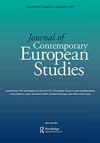EU Eastern Partnership, Ontological Security and EU- Ukraine/Russian warfare
IF 1.8
3区 社会学
Q1 AREA STUDIES
引用次数: 0
Abstract
ABSTRACT This article aims to analyse security within Europe’s Eastern Partnership as perceived from the outside – notably by Russia. It analyses the impact of Russia’s security on European security thinking in its Eastern Partnership through the lens of ontological security. Russia’s relationship with the West, based on its ontological security fears, is characterised by the collective trauma and stigma of USSR disintegration. Europe’s ontological security anxiety and fear in its relationship with Russia is caused by the wars in Georgia and Ukraine, as well as Russia’s hybrid warfare. The ontological security interaction in the Eastern Neighbourhood has had two effects: (1) it heightened Putin’s emphasis on the protection of spiritual, cultural and national identity and how the stigma of territorial loss plays a strategic role on the ability to build Russian collective identity reflexively; and (2) Russia has aimed at a re-construction of Europe along different geopolitical lines, whereby Dugin’s Eurasian views have shaped Putin’s discourse. This article analyses the EU’s policy and practices following the war in Ukraine (in two phases in 2014 and 2022) in the Eastern Neighbourhood.欧盟东部伙伴关系,本体论安全与欧盟-乌克兰/俄罗斯战争
本文章由计算机程序翻译,如有差异,请以英文原文为准。
求助全文
约1分钟内获得全文
求助全文
来源期刊

Journal of Contemporary European Studies
Multiple-
CiteScore
2.70
自引率
7.70%
发文量
84
期刊介绍:
The Journal of Contemporary European Studies (previously Journal of European Area Studies) seeks to provide a forum for interdisciplinary debate about the theory and practice of area studies as well as for empirical studies of European societies, politics and cultures. The central area focus of the journal is European in its broadest geographical definition. However, the examination of European "areas" and themes are enhanced as a matter of editorial policy by non-European perspectives. The Journal intends to attract the interest of both cross-national and single-country specialists in European studies and to counteract the worst features of Eurocentrism with coverage of non-European views on European themes.
 求助内容:
求助内容: 应助结果提醒方式:
应助结果提醒方式:


